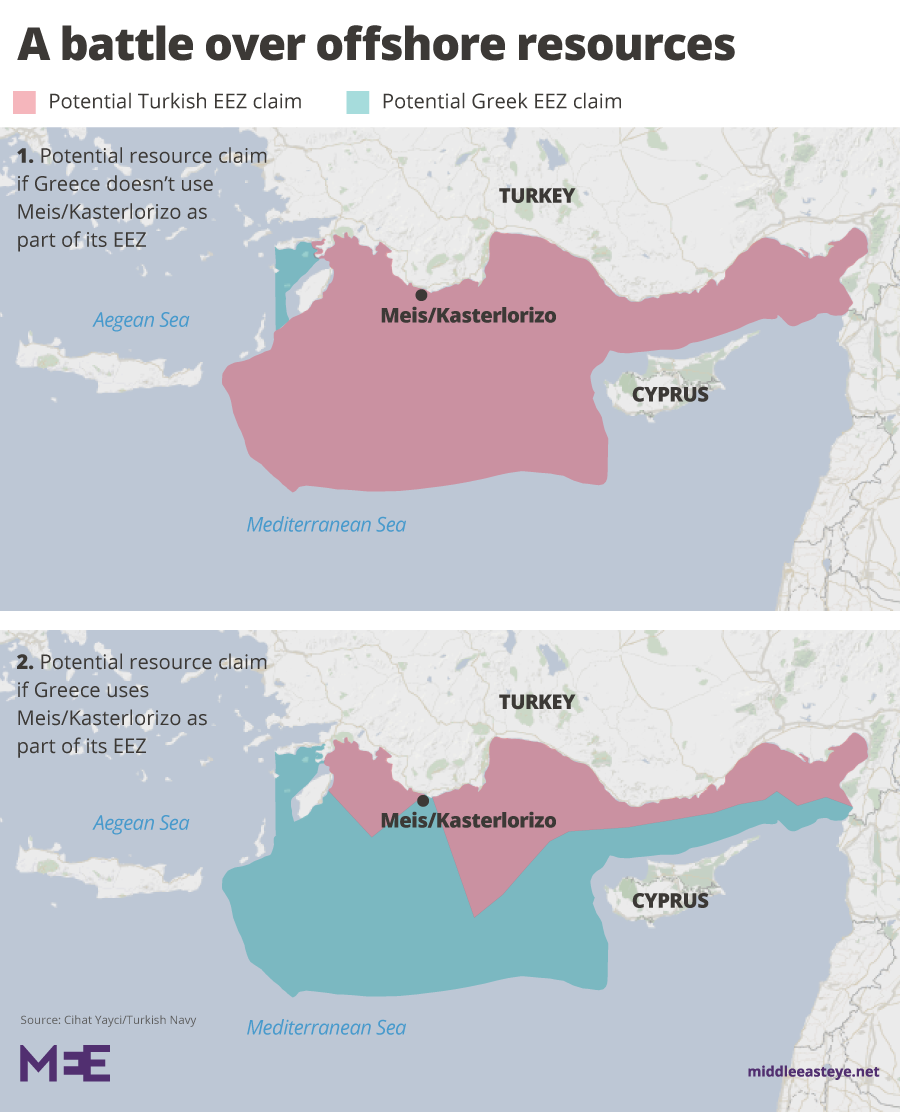Eastern Mediterranean: Turkey withdraws ships from contested waters

Turkey's government withdrew a seismic research vessel and an accompanying warship from contested waters near Greece on Sunday, in a move widely seen as de-escalating tensions between the two nations and opening the way for negotiations with Athens.
Even though the Turkish Energy Ministry said that the Oruc Reis vessel had been anchored in the Antalya gulf to refuel and carry out maintenance work, a senior Turkish official on Monday implied that it was a step towards diplomacy.
Stay informed with MEE's newsletters
Sign up to get the latest alerts, insights and analysis, starting with Turkey Unpacked
“Greece and the EU shouldn’t waste [this] chance for diplomacy and take reciprocal steps,” said Ibrahim Kalin, chief foreign policy adviser for Turkish President Recep Tayyip Erdogan.
Greek officials had been pushing for a small concession which might create an opportunity to start negotiations, such as withdrawing the Oruc Reis for refuelling.
Greek Prime Minister Kyriakos Mitsotakis on Sunday welcomed the move. “If there are steps towards this direction, Greece is ready to start a new cycle of exploratory contacts with Turkey," he said in a televised press conference.
Turkey and Greece have both laid claims to areas in the Eastern Mediterranean, where experts believe there are vast, untapped hydrocarbon resources.
Both countries have vehemently disagreed over each other's claims in the region, based on conflicting views as to who controls the continental shelves in the area's waters.
'Put yourself in our shoes'
Greece believes that the latest escalation with Ankara started last year, when Turkey signed a maritime delimitation deal with Libya. It is thought that this was an attempt to disrupt a project for a pipeline to carry Israeli gas to Europe through the Eastern Mediterranean.
Ankara believes that it was Greece and Cyprus who claimed rights in the contested waters because of the same project.
Escalation led to the deployment of the Oruc Reis for exploration of the energy reserves, along with Turkish warships to provide protection.
'Turkish opposition claims that we have conceded are not true. The ship will be back once it is refuelled and maintenance is completed'
- Turkish Minister of Foreign Affairs Mevlut Cavusoglu
“When Turkey sends warships, Greece is naturally concerned. Put yourself in our shoes. How would you feel if a country like Russia did the same to Turkey?” a Greek official told Middle East Eye. “Turkey is a neighbouring country with a much bigger size, population and an army. Of course it is deeply troubling for us.”
Last month, Ankara agreed to suspend its drilling work west of Cyprus for a month, in order to allow time for German-mediated diplomatic negotiations.
However, in the middle of the talks, Greece signed a maritime deal with Egypt, angering Ankara.
"We had made preparations to issue a joint statement of understanding with Greece at the time," Turkey's Minister of Foreign Affairs Mevlut Cavusoglu said last week in televised remarks. "However, less than a day from our scheduled release of the text, they secretly signed a maritime delimitation deal with Egypt. This step surprised everyone, including Germany and the EU."
The Greek official said they had not intended to harm the talks with Ankara, since they had been working on the Egyptian maritime deal for many years.
“Ankara should see that we have only made an agreement on the waters concerning Libya and Egypt. We didn't agree on anything concerning [the Greek island of] Kastellorizo,” the official said. “We don’t think it undermined the talks because there was no negotiations on the topic anyway.”
Greece later officially rejected a Nato-brokered dialogue on de-escalating tensions between the Turkish and Greek militaries. A senior Turkish diplomatic source told journalists last week that the Turkish government had already issued strict orders to its naval vessels not to fire at Greek ships unless they were under fire.
After initial resistance, Turkish and Greek officials met at Nato's HQ in Brussels. “It was technical talks on de-escalation as Turks required,” the Greek official said.
The official said Mitsotakis was open to dialogue and ready to negotiate on some of the matters that had pitted both countries against each other since the 1990s. “We have already chosen our negotiation team,” the official added.
Cavusoglu on Sunday welcomed Mitsotakis’s remarks, describing them as positive, while saying that Turkey had not taken a step backwards by withdrawing its ship. “Turkish opposition claims that we have conceded are not true,” he said. “The ship will be back once it is refuelled and maintenance is completed.”
Second thoughts
However, Mitsotakis’s recent decision to make a massive arms purchase from France has led Turkish officials to have second thoughts on Greece's intentions.
Turkish Defence Minister Hulusi Akar also called for dialogue with Greece on Sunday in the Turkish coastal town of Kas in Antalya, right across from the tiny island of Kastellorizo, which the Greek President Katerina Sakellaropoulou was visiting.
“We are in support of peaceful dialogue with Greece. However, France and Macron are trying to cause provocations. Greek people are knowledgeable people and they should see it. Macron has commercial interest to sell weapons to Greece,” Akar said, in reference to latest decision to sell French Dassault Rafale warplanes to Athens.
The main point of disagreement between the two governments stemmed from the islands belonging to Greece in the Aegean Sea and Mediterranean. While Turkey said Greece had a right to declare an exclusive economic zone in the region, it insisted Athens should take into consideration Turkish interests.
For example, Athens treated the Greek island of Kastellorizo as a mainland area, and was therefore seeking maritime rights. However, the island was just 2km from Turkey’s Antalya, while the Greek mainland was more than 500km away.
Middle East Eye delivers independent and unrivalled coverage and analysis of the Middle East, North Africa and beyond. To learn more about republishing this content and the associated fees, please fill out this form. More about MEE can be found here.







